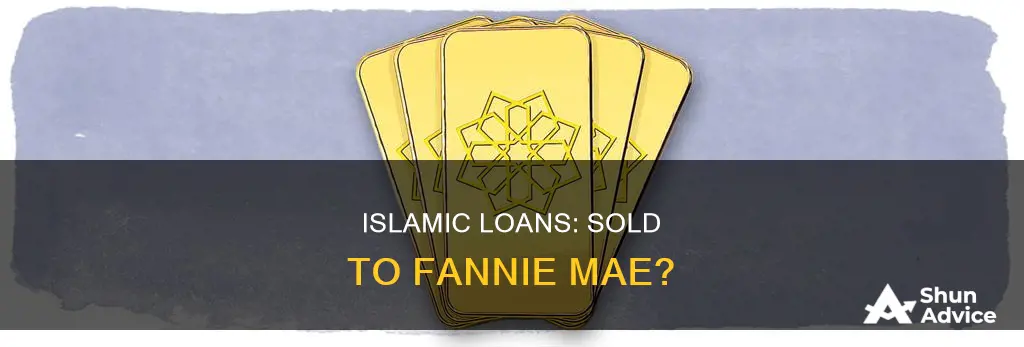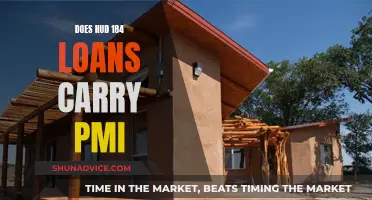
The Federal National Mortgage Association (FNMA), commonly known as Fannie Mae, is a United States government-sponsored enterprise (GSE) that was established in 1938 to rejuvenate the housing market by making more mortgages available. In 2002, Fannie Mae agreed to purchase $10 million worth of home loans from Lariba, a small lender in Southern California that lends money for homes and cars based on Islamic religious principles that prohibit the paying or collecting of interest. This agreement was intended to encourage homeownership among the growing U.S. Muslim population and provide necessary liquidity for Lariba, allowing them to extend more home loans to Muslims. While some have criticised Islamic lending institutions for their lack of uniformity and use of various accounting systems, Fannie Mae has stated that the Lariba pact is part of a larger push among lending institutions to recognise different cultures' approaches to money.
What You'll Learn
- Islamic loans are based on religious principles that prohibit interest payments or collection
- Fannie Mae purchases mortgages from lenders and repackages them for investors
- Islamic loans can help encourage homeownership among the growing US Muslim population
- Fannie Mae is a government-sponsored enterprise that provides liquidity to loan originators
- Islamic loans are criticised for their lack of uniformity and use of various accounting systems

Islamic loans are based on religious principles that prohibit interest payments or collection
Islamic banking, therefore, exists to further the socio-economic goals of an Islamic community. This is achieved by sharing profits and losses with the enterprise the bank underwrites. Islamic banks are also required to collect zakat (obligatory religious alms giving) from customers' accounts, and each bank is supervised and advised by a board of Sharia experts to ensure all activities are in line with Islamic principles.
Islamic finance encourages partnership and the sharing of profit and risk. This can be between two individuals, an individual and a business, or a business and another business. Anyone can use Islamic finance products and services – one does not have to be a Muslim. There are several Islamic finance products and services available in the UK, for example.
Islamic finance also prohibits investment in businesses involved in activities that are forbidden ("haraam"), such as selling alcohol or pork, or producing media such as gossip columns or pornography. Charging extra for late payment is also prohibited, although some authors believe late fees may be charged if they are donated to charity.
In 2002, the Federal National Mortgage Association (FNMA), commonly known as Fannie Mae, agreed to purchase $10 million worth of home loans from Lariba, a small lender in Southern California. Lariba lends money for homes and cars based on Islamic religious principles that prohibit the paying or collecting of interest. This agreement was made in the hope of encouraging homeownership among the growing U.S. Muslim population.
Income-Based Loan Payment Plans: Counting Couples' Income
You may want to see also

Fannie Mae purchases mortgages from lenders and repackages them for investors
The Federal National Mortgage Association (FNMA), commonly known as Fannie Mae, is a United States government-sponsored enterprise (GSE) and a publicly traded company. It was founded in 1938 during the Great Depression as part of Franklin Delano Roosevelt's New Deal. The corporation's purpose is to expand the secondary mortgage market by securitising mortgage loans in the form of mortgage-backed securities (MBS), allowing lenders to reinvest their assets into more lending. This increases the number of lenders in the mortgage market by reducing reliance on locally based savings and loan associations.
Fannie Mae makes money by borrowing at low rates and then reinvesting its borrowings into whole mortgage loans and mortgage-backed securities. It purchases whole loans and then securitises them for the investment market by creating MBS that are either retained or sold. As a GSE, Fannie Mae is compelled by law to provide liquidity to loan originators in all economic conditions. It must legally ignore adverse market conditions that appear unprofitable. If there are loans available for purchase that meet its predetermined underwriting standards, it must purchase them if no other buyers are available.
Fannie Mae buys loans from approved mortgage sellers and securitises them. It then sells the resultant mortgage-backed security to investors in the secondary mortgage market, along with a guarantee that the stated principal and interest payments will be timely passed through to the investor. By purchasing the mortgages, Fannie Mae and Freddie Mac provide banks and other financial institutions with fresh money to make new loans. This gives the United States housing and credit markets flexibility and liquidity.
In 2002, Fannie Mae agreed to purchase $10 million worth of home loans from Lariba, a small lender in Southern California. Lariba lends money for homes and cars based on Islamic religious principles that prohibit the paying or collecting of interest. The agreement with Fannie Mae provided Lariba with the necessary liquidity to extend more home loans to Muslims, allowing them to gain exposure to different U.S. cultures.
Renovation Loan Program: Is the HomePath Option Still Available?
You may want to see also

Islamic loans can help encourage homeownership among the growing US Muslim population
Fannie Mae is a quasi-governmental entity that purchases mortgages and sometimes repackages them to sell to investors. It is one of the two large purchasers of mortgages in the secondary market, with its sibling, Freddie Mac, being the other. By investing in mortgages, Fannie Mae creates more liquidity for lenders, including banks, thrifts, and credit unions. This, in turn, allows lenders to underwrite or fund additional mortgages.
The agreement with Fannie Mae provides the necessary liquidity for Lariba to extend more home loans to Muslims, allowing them to gain exposure to different U.S. cultures. Lariba lends to non-Muslims as well. Under Lariba's model, the firm and homeowner agree upon a maximum monthly payment based on the property's fair rental value. Using that payment, Lariba figures out the "implied interest rate," which symbolizes the rate of return on the transaction.
Fannie Mae's purchase of Islamic loans is an example of a larger push among lending institutions to recognize different cultures' approaches to money. This push includes recognizing that certain groups pool money within families rather than setting up bank accounts, and that others frequently rent out rooms for extra money or work in seasonal jobs.
Islamic home financing providers like Guidance Residential also partner with Freddie Mac and Fannie Mae to bring them on board as investors in their mortgages. Guidance Residential's co-ownership model of Islamic home financing has assisted more than 40,000 families over more than 20 years.
HSBC and SONYMA Loans: What You Need to Know
You may want to see also

Fannie Mae is a government-sponsored enterprise that provides liquidity to loan originators
The Federal National Mortgage Association (FNMA), commonly known as Fannie Mae, is a government-sponsored enterprise (GSE) that provides liquidity to loan originators. It was established in 1938 during the Great Depression as part of Franklin Delano Roosevelt's New Deal. The purpose of Fannie Mae is to expand the secondary mortgage market by securitising mortgage loans in the form of mortgage-backed securities (MBS), allowing lenders to reinvest their assets into more lending. This increases the number of lenders in the mortgage market by reducing the reliance on locally based savings and loan associations.
Fannie Mae makes money by borrowing at low rates and then reinvesting its borrowings into whole mortgage loans and mortgage-backed securities. It borrows in the debt markets by selling bonds and provides liquidity to loan originators by purchasing whole loans. It purchases whole loans and then securitises them for the investment market by creating MBS that are either retained or sold.
As a GSE, Fannie Mae is compelled by law to provide liquidity to loan originators in all economic conditions. It must legally ignore adverse market conditions which appear unprofitable. If there are loans available for purchase that meet its predetermined underwriting standards, it must purchase them if no other buyers are available.
Fannie Mae is one of the two largest purchasers of mortgages on the secondary market. In the first three quarters of 2024, it provided $274 billion in liquidity to the mortgage market. It buys mortgages from big banks and lenders, while its sibling, Freddie Mac, buys them from credit unions and small regional banks. Both enterprises have similar goals: to assist people who might otherwise find it difficult to obtain a mortgage, and to buy mortgages from lenders to pump more money into the system.
In 2002, Fannie Mae agreed to purchase $10 million worth of home loans from Lariba, a small lender in Southern California. Lariba lends money for homes and cars based on Islamic religious principles that prohibit the paying or collecting of interest. The agreement with Fannie Mae provided necessary liquidity for Lariba, allowing the firm to extend more home loans to Muslims and non-Muslims.
Leasing vs Loan: How Different Are Their Insurance Policies?
You may want to see also

Islamic loans are criticised for their lack of uniformity and use of various accounting systems
Islamic loans are based on religious principles that prohibit the paying or collecting of interest. Islamic banking is culturally distinct and ethically driven, prohibiting usury, speculation, and gambling. It also forbids any investments involving substances or items prohibited by the Quran, such as alcohol, gambling, and pork. These principles are derived from Shariah law and the Islamic prophet Muhammad, who insisted that lenders should not gain any advantage or benefits from a loan.
Islamic banking uses equity participation systems, where banks lend money without interest and, instead, receive a share in the profits of the borrowing business. This means that if a business defaults or does not make a profit, the bank does not benefit. This makes Islamic banking institutions more risk-averse, and they tend to avoid businesses associated with economic bubbles.
Criticisms of Islamic loans include a lack of uniformity and the use of various accounting systems. For example, some have criticised the distinction between credit sales and interest, arguing that profit from credit sales is equivalent to interest. Islamic banks also offer "demand deposits", which promise to return funds to depositors on demand but usually pay little to no return on investment. Critics have also pointed out the lack of transparency and failure to follow Islamic banking standards in some institutions.
Despite these criticisms, Islamic loans are important for encouraging homeownership among the growing Muslim population in the United States. By recognising different cultural approaches to money, lending institutions like Fannie Mae can promote financial inclusion and diversity.
HUD Construction Loans: What You Need to Know
You may want to see also
Frequently asked questions
The Federal National Mortgage Association (FNMA), commonly known as Fannie Mae, is a United States government-sponsored enterprise (GSE) and a publicly traded company. Its primary function is to expand the secondary mortgage market by securitizing mortgages, allowing lenders to reinvest their assets into more lending and increasing the number of lenders in the mortgage market.
In 2002, Fannie Mae agreed to purchase $10 million worth of home loans from Lariba, a small lender in Southern California. Lariba lends money for homes and cars based on Islamic religious principles that prohibit the paying or collecting of interest. This agreement was made to encourage homeownership among the growing U.S. Muslim population.
Fannie Mae makes money by borrowing at low rates and then reinvesting its borrowings into whole mortgage loans and mortgage-backed securities (MBS). It purchases whole loans and then securitizes them for the investment market, either retaining or selling them.
The agreement with Fannie Mae provides liquidity for Lariba, allowing them to extend more home loans to Muslims and facilitating their integration into different U.S. cultures. Additionally, it provides access to financing and peace of mind for Muslim homebuyers, adhering to Islamic finance principles.







